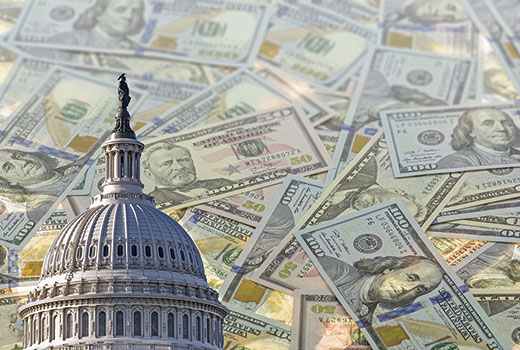By this time, many decisions have already been made regarding what churches should do concerning the Federal Government’s offer of loans/grants to nonprofits. Because of the severe economic impact on small businesses and churches, the Small Business Administration made a special exemption for churches to pursue loans, which could turn into grants. The question most congregations struggled with was whether or not to apply for the loans.
The chief overarching concern was the potential violation of church and state separation. Would a church be forced to change its beliefs and practices in order to get the money (i.e., change its biblical definition of marriage, etc.)? Would there be ramifications in the future? These and other concerns prompted many tele-meetings and published reports from both sides of the issue. In the final analysis, at least for South Carolina Baptists, it became a question of the autonomy of the local church.
South Carolina Baptist Convention Executive Director-Treasurer Gary Hollingsworth said, “The SCBC is not recommending that a church or ministry should or should not take advantage of the funding since we respect the autonomy of the local church, but we are trying to provide as much information as possible so that pastors and leaders can make informed decisions.” On April 3, he counseled churches that “a wait-and-see attitude might be the best practice,” even though there was a risk of missing out on the money. “That risk may be worth taking, given the fact there are so many unknowns for now,” he said.
Some former SCBC presidents were asked to weigh in on this issue. Current president Josh Powell said, “I believe that each pastor must do two things when it comes to this. First, they must become educated on the ins and outs of the plan. Second, they must pray and seek God’s wisdom. Whether you use this money or not is up to each church and their leadership.”
Wayne Dickard stated, “The fact that the loans may be forgiven constitutes a federal grant, and when the federal grants are accepted by another party, it gives the government far-reaching say into the way that party runs its business. While applying for the money is a decision to be made by each autonomous church, past history, the Constitution and godly wisdom could argue against applying for federal money.”
Fred Stone noted, “As a general rule, I believe Ronald Reagan was right when he said, ‘The most terrifying words in the English language are, ‘I’m from the government and I am here to help.’ I believe this is one government-backed program that can help qualified churches that are struggling financially due to the economic hardship caused by the COVID-19 pandemic. I do not think the CARES Act will open the door to government interference concerning matters of faith and practice.”
Bryant Sims said, “Personally, I am afraid that a ‘forgivable loan’ from the government directly to a church blurs the line of separation of church and state. I do believe there is a more amicable way for hurting churches. Church employees are eligible for unemployment right now. That would be an individual transaction, instead of a corporate one. If a church is unable to pay staff, they could furlough them and let the individual decide what is best for them without the church directly receiving funds from the Federal Government.”
Marshall Blalock stated, “The clarification (published by the Small Business Administration) protecting religious freedom for churches and Christian nonprofits, answered my greatest concerns about the program. Our church received federal funds to cover flood damage after Hurricane Hugo. This is a similar kind of emergency, and we are considering applying for the program if the economic conditions warrant it.”
Dan Collins, a Greenville attorney and long-time leader in both state and national convention work, said, “In my opinion, a Southern Baptist church that adheres faithfully to the Baptist Faith and Message should not apply for these SBA, federally guaranteed loans. The issue is not whether or not the Federal Government could seek redress against the church for practicing its purposefully discriminatory biblical stance on issues like heterosexual marriage and gender equality. They obviously could. The issue is will they?”
The Courier conducted a small poll to determine where our churches stood on the issue. In our small sampling, 46.67 percent favored accepting money from the government, while 40.0 percent were opposed. Those holding no opinion one way or the other was 13.33 percent.
Among those who answered “No opinion,” one person’s comment caught The Courier’s attention: “There may be a special situation that a church would apply for these funds. I want our folks to have complete trust in God and not the government.”
(For related articles, see “Point” by Dan Collins and “Counterpoint” by Marshall Blalock.)

